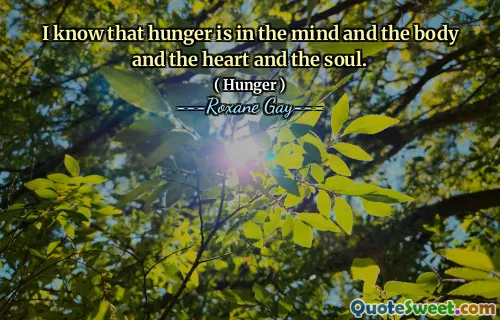In my more generous moments, I tried to believe the locals were using anger to mask their fear of living in a dying town in a changing world.
In Roxane Gay's book "Hunger," the author delves into the complexities of living in a town that feels stagnant and hopeless. The locals often express anger, perhaps as a defense mechanism against the fear of their reality—a diminishing community in an ever-evolving world. This anger may mask deeper insecurities and a sense of loss as they confront the challenges that arise in a town that many perceive as dying.
Gay's reflection on the emotions of those in her community highlights the struggle between acceptance and resistance to inevitable change. The facade of anger could indicate an underlying vulnerability, as the residents grapple with feelings of powerlessness in the face of transformation. This insight into the town's psyche reveals the profound impact of environment and community on individual emotional experiences.






